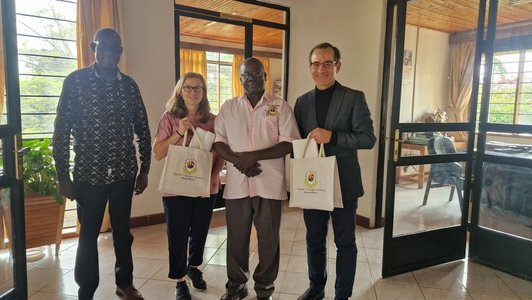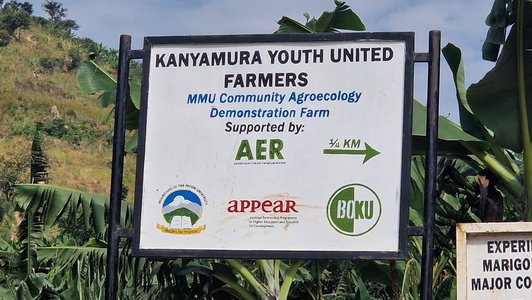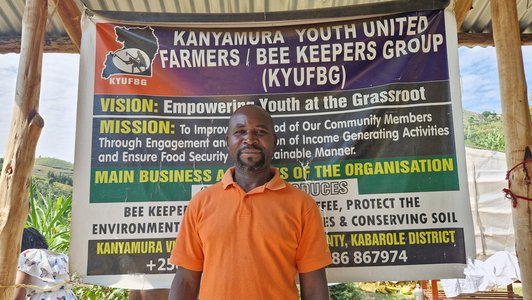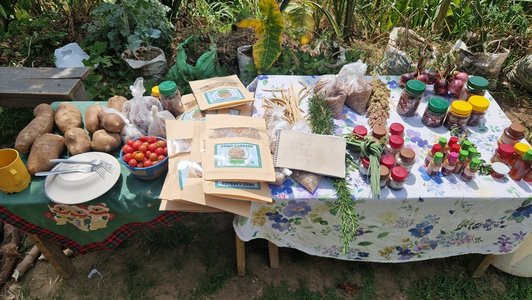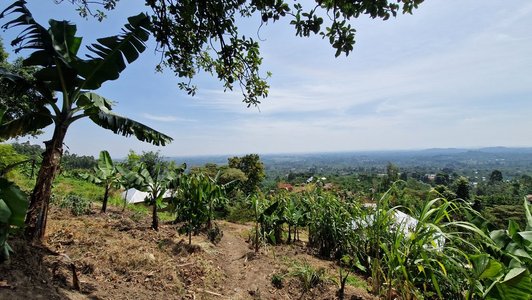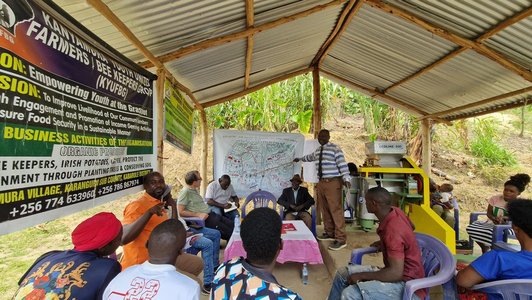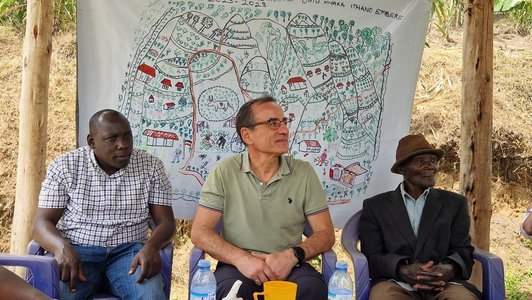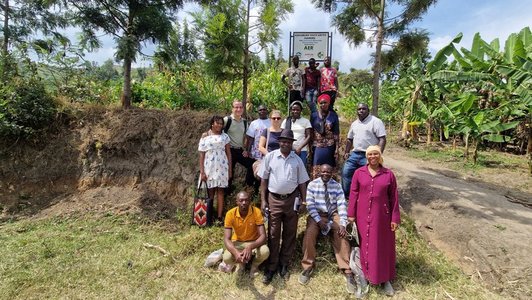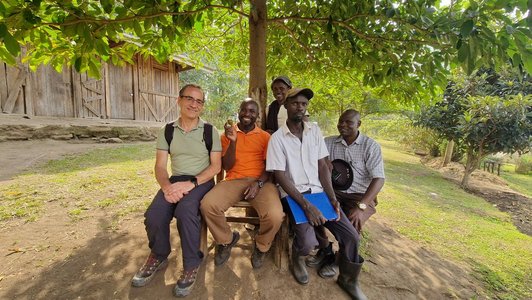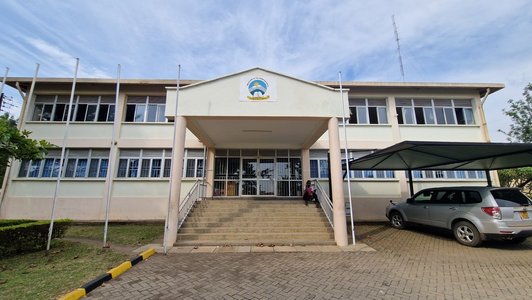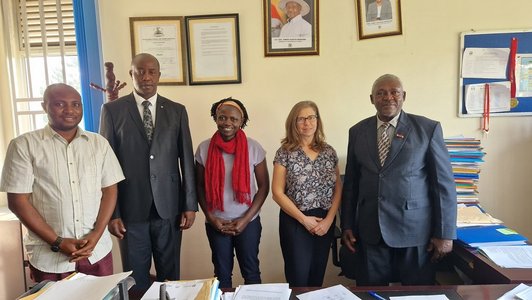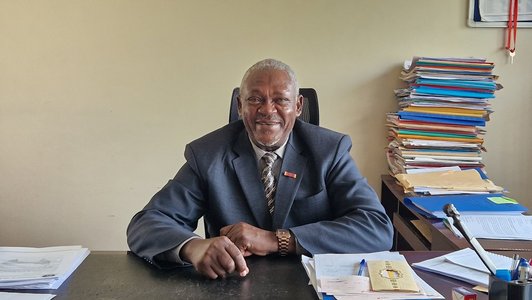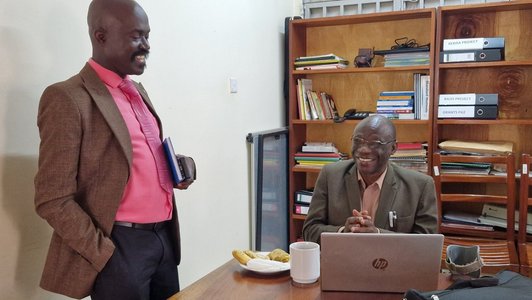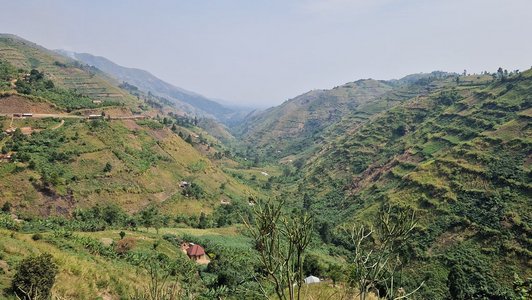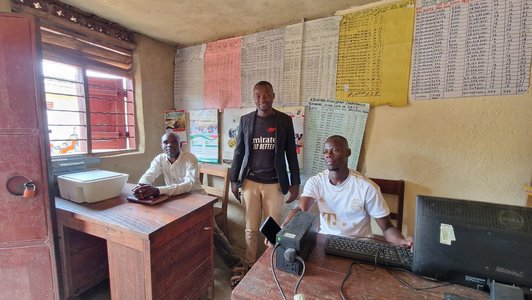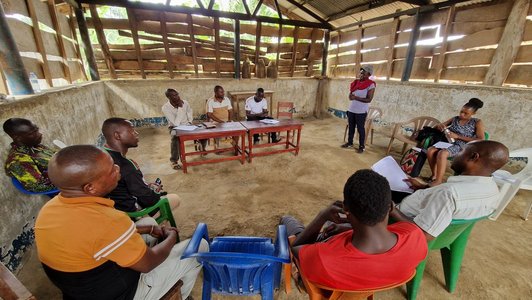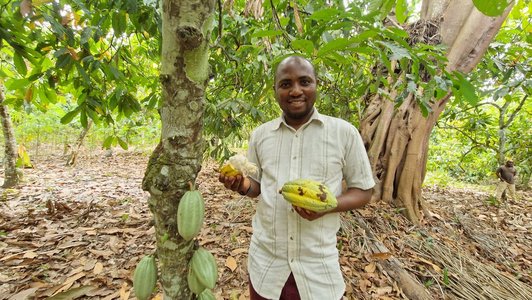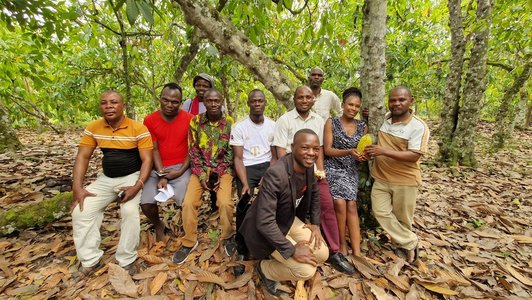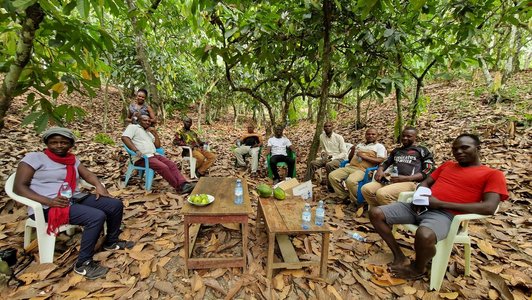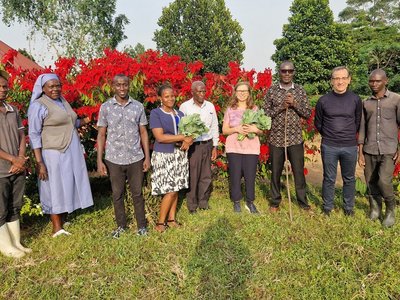

The AER Project aims to strengthen higher education, research, and science communication in agroecology within the Rwenzori Region of Western Uganda. Building on a successfully completed academic partnership, Phase II introduces key developments. Notably, Mountains of the Moon University (MMU) now serves as the coordinating institution. Additionally, Uganda Martyrs University (UMU) and the NGO Sasakawa Africa Association have joined as new partners alongside BOKU University. In January 2025, representatives from the APPEAR Office – Ulrich Hörmann and Elke Stinnig - visited the region, engaging with participating universities and key stakeholders to strengthen collaboration.
The main campus of Uganda Martyrs University (UMU) in Nkozi, southwest of Kampala was the first stop on 14 January. The APPEAR representatives were warmly welcomed by Dr. Fr. Joseph Kisoga, the Academic Registrar (on behalf of the Vice Chancellor), along with Mrs. Lucy Ntimba, the Vice Chancellor's personal assistant, and Dr. Pius Nina Mbuya, who coordinates AER project activities at UMU. Discussions focused on the project's outcomes. UMU has been actively involved in various initiatives, including curriculum review, teaching the Agroecology Master’s program, and staff training in advanced pedagogy. The two universities have also collaborated on student and staff exchanges related to the teaching and implementation of the master’s program in agroecology. Another key component was the upgrade of UMU’s demonstration unit, which the APPEAR representatives visited after a tour of the university’s green campus. Due to the significant investment in the agroecology farm, UMU attracted additional funding from SNV Uganda which was used to, establish a two-acre fodder farm. SNV Uganda supported the training and the provision of planting materials. Undergraduate students of agriculture and agribusiness are fully engaged in every stage of the fodder production value chain. Additionally, the fodder crops support the animals at the demo farm unit. The unit also serves as a practical showcase of how agroecological practices—such as mulching and diversification of crops—can enrich poor, sandy soils.
On 18 January the Youth United Farmers Group was visited. The youth group, located in Kabarole District, was selected as a cooperation partner for the project for several reasons. It is easily accessible from Fort Portal, was already highly active before the project’s involvement, and had initiated group efforts independently without waiting for external intervention. Additionally, the group shares the project's vision and selecting them was seen as a way to recognize and support their commitment. The group has held several meetings with the project demo team, culminating in a finalized needs and demand assessment. This assessment has guided the establishment of a community agroecology demonstration farm. The demo farm is managed by a dedicated young man, with members coming together whenever work is needed. Each member also cultivates their own piece of land, further strengthening their commitment to sustainable agriculture. During the visit, the group leader, Muhindo Esra, gave a brief presentation on their achievements. He used a map they had drafted at the project's inception to high light their progress. Following this, the youth members introduced themselves. The group then led a tour of the farm, showcasing various agroecological improvements. Several trenches had been constructed to mitigate erosion, and crop diversification efforts were evident. The community demonstration unit has also been equipped with a solar power system, a goat shelter stocked with goats, a rabbit hutch, and an energy-saving stove. Additionally, an EcoSan toilet was constructed; however, overcoming the cultural taboo around handling human waste remains a challenge.
So far, the community demo has hosted MMU students, staff, and the Sasakawa Africa Association (SAA) team. Several planning meetings have been held with SAA, a non-academic partner, to organize community training sessions for the Kanyamura Youth United Farmers group. These trainings will be designed based on the completed needs and demand assessment. The women of the group prepared food for the visitors, and a display table showcased various community products, including tea, honey, and dried vegetables. Elke Stinnig praised the engaging and well-prepared programme, suggesting that it could also be offered to tourists as an agritourism experience. Visitors could learn about organic farming in the Rwenzori region, gaining insights into rural life beyond the typical national park tours. The group effectively demonstrated the challenges of farming in this mountainous region and the importance of soil and water conservation structures. Many tourists would likely appreciate the opportunity to explore these aspects of rural life. The group also has a comfortable shaded area for visitors, a facility capable of cooking for larger groups, and a strong sense of pride in their work—all of which make them well-positioned to offer an authentic agritourism experience.
Afterward, the demo unit at MMU was visited. The AER project is fully integrated into the Department of Environment, Natural Resources, and Tourism, aligning with its activities. This integration enhances sustainability and fosters a sense of ownership at both the departmental and faculty levels. Additionally, the project facilities, including the demo unit, are widely utilized by faculty members for practical courses, extending beyond agroecology to other disciplines. This cross-disciplinary use further strengthens the project's impact within the university.
On 21 January APPEAR paid a courtesy visit to the top management at MMU. The team was welcomed by the deputy vice Chancellor in charge of Academic affairs Prof. John Kasenene, and the deputy Vice Chancellor in charge of Finance and Administration Prof. Edmond Kagambe.
The APPEAR team expressed gratitude to MMU's top management for creating a supportive environment for the project which has led to its success. They also acknowledged and appreciated the dedicated efforts of the project coordinator, Dr. Violet Kisakye, and her team. The MMU management also thanked the APPEAR team for the financial support that has been very transformative in the teaching and learning of the Agroecology program. Management was particularly pleased with the projects link with the farming communities that is very crucial for socioeconomic transformation of the region.
Another meeting was held with the university accounts assistant, responsible for key financial operations, including managing project funds, and ensuring compliance with statutory obligations. Within the AER Project, Ali Junior Mwesigwa is responsible for budget control and financial reporting. Besides financial matters related to the AER Project also the role of the AER project at MMU were discussed. Currently, MMU manages 15 ongoing international projects, with five more in the contracting phase. Since MMU transitioned into a public university in 2022, more partnerships with international institutions are emerging. The AER Project has served as a model for other international projects at MMU, benefiting not only the university but also surrounding communities.
Last but not least the team visited Kaghema Aghetereana Cooperative Society Limited in Bundibugyo District. The chairperson, Mugisa Jackson, provided a brief report on the cooperative’s progress. Established in 1997 with only 20 members, the cooperative has since grown into an independent, self-reliant organization with 879 members. Its primary objective is to produce high-quality, certified organic cocoa beans, focusing on business and joint marketing as well as sustainable agricultural practices.
The cooperative’s manager, Mark Basaliza, shared their experience of working with various NGOs but expressed frustration that many visitors engage with the group without providing meaningful support or leaving a lasting impact. He emphasized the need for direct links to potential donors. One of the cooperative’s main challenges is transportation; the lack of a motorcycle hinders member mobilization on market days, farm visits, and internal inspections.
However, Thaddeo Tibasiima, a representative from MMU, firmly rejected this criticism. He highlighted MMU’s consistent engagement, including regular visits, training sessions, and ongoing support. He also pointed out that agroecology encourages self-sufficiency and suggested a practical solution: if each member contributed just one kilogram of cocoa, the cooperative could afford to purchase a motorcycle. MMU representatives even offered assistance in procuring one from Kampala. Due to its distance from Fort Portal, the cooperative has not been frequently visited. However, during the previous project phase, it received training on agroecological practices. This visit also served to explore the possibility of Kaghema Aghetereana Cooperative Society Limited becoming a partner in a joint project proposal for national research funding (a collaboration between MAK and MMU). Currently, cocoa prices are at a record high, leading farmers to allocate nearly all available land to cocoa production. As a result, food supply for local farming families has sometimes become insufficient. Additionally, cocoa is predominantly cultivated by men, with income distribution remaining unequal within households. This gender imbalance was evident during the meeting, as no women were present, highlighting an ongoing challenge in ensuring fair economic participation. For these reasons, the group was selected as one of the beneficiaries of the trainings on agroecological principles and practices under the first AER project. The objective of the trainings was to encourage the group to adopt agroecology farming within the cocoa farms in order to improve farm diversity, increase household resilience and reduce gender inequalities.
Overall, the visit was a great success. The OeAD extends its gratitude to Dr. Violet Kisakye and the entire AER team for their excellent organization and facilitation of the activities. For the APPEAR team, it was an incredibly insightful experience, offering valuable knowledge and a deeper understanding of the project and its context. They also advocated for the continuation of the project’s activities beyond its completion.

